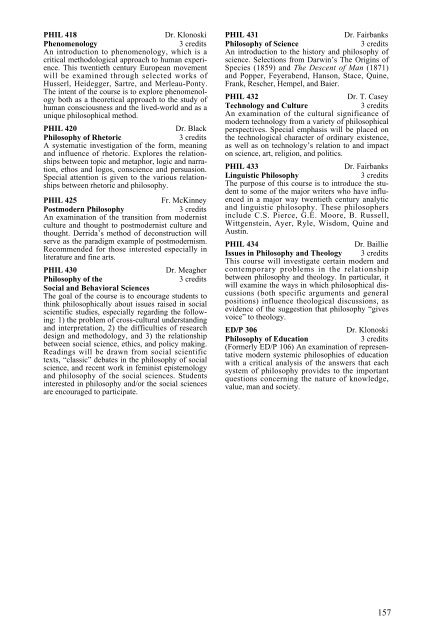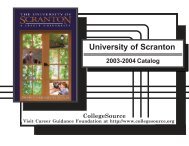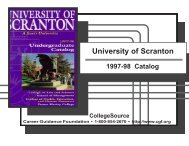You also want an ePaper? Increase the reach of your titles
YUMPU automatically turns print PDFs into web optimized ePapers that Google loves.
PHIL 418 Dr. Klonoski<br />
Phenomenology 3 credits<br />
An introduction to phenomenology, which is a<br />
critical methodological approach to human experience.<br />
This twentieth century European movement<br />
will be examined through selected works <strong>of</strong><br />
Husserl, Heidegger, Sartre, and Merleau-Ponty.<br />
<strong>The</strong> intent <strong>of</strong> the course is to explore phenomenology<br />
both as a theoretical approach to the study <strong>of</strong><br />
human consciousness and the lived-world and as a<br />
unique philosophical method.<br />
PHIL 420 Dr. Black<br />
Philosophy <strong>of</strong> Rhetoric 3 credits<br />
A systematic investigation <strong>of</strong> the form, meaning<br />
and influence <strong>of</strong> rhetoric. Explores the relationships<br />
between topic and metaphor, logic and narration,<br />
ethos and logos, conscience and persuasion.<br />
Special attention is given to the various relationships<br />
between rhetoric and philosophy.<br />
PHIL 425 Fr. McKinney<br />
Postmodern Philosophy 3 credits<br />
An examination <strong>of</strong> the transition from modernist<br />
culture and thought to postmodernist culture and<br />
thought. Derrida’s method <strong>of</strong> deconstruction will<br />
serve as the paradigm example <strong>of</strong> postmodernism.<br />
Recommended for those interested especially in<br />
literature and fine arts.<br />
PHIL 430 Dr. Meagher<br />
Philosophy <strong>of</strong> the 3 credits<br />
Social and Behavioral Sciences<br />
<strong>The</strong> goal <strong>of</strong> the course is to encourage students to<br />
think philosophically about issues raised in social<br />
scientific studies, especially regarding the following:<br />
1) the problem <strong>of</strong> cross-cultural understanding<br />
and interpretation, 2) the difficulties <strong>of</strong> research<br />
design and methodology, and 3) the relationship<br />
between social science, ethics, and policy making.<br />
Readings will be drawn from social scientific<br />
texts, “classic” debates in the philosophy <strong>of</strong> social<br />
science, and recent work in feminist epistemology<br />
and philosophy <strong>of</strong> the social sciences. Students<br />
interested in philosophy and/or the social sciences<br />
are encouraged to participate.<br />
PHIL 431 Dr. Fairbanks<br />
Philosophy <strong>of</strong> Science 3 credits<br />
An introduction to the history and philosophy <strong>of</strong><br />
science. Selections from Darwin’s <strong>The</strong> Origins <strong>of</strong><br />
Species (1859) and <strong>The</strong> Descent <strong>of</strong> Man (1871)<br />
and Popper, Feyerabend, Hanson, Stace, Quine,<br />
Frank, Rescher, Hempel, and Baier.<br />
PHIL 432 Dr. T. Casey<br />
Technology and Culture 3 credits<br />
An examination <strong>of</strong> the cultural significance <strong>of</strong><br />
modern technology from a variety <strong>of</strong> philosophical<br />
perspectives. Special emphasis will be placed on<br />
the technological character <strong>of</strong> ordinary existence,<br />
as well as on technology’s relation to and impact<br />
on science, art, religion, and politics.<br />
PHIL 433 Dr. Fairbanks<br />
Linguistic Philosophy 3 credits<br />
<strong>The</strong> purpose <strong>of</strong> this course is to introduce the student<br />
to some <strong>of</strong> the major writers who have influenced<br />
in a major way twentieth century analytic<br />
and linguistic philosophy. <strong>The</strong>se philosophers<br />
include C.S. Pierce, G.E. Moore, B. Russell,<br />
Wittgenstein, Ayer, Ryle, Wisdom, Quine and<br />
Austin.<br />
PHIL 434 Dr. Baillie<br />
Issues in Philosophy and <strong>The</strong>ology 3 credits<br />
This course will investigate certain modern and<br />
contemporary problems in the relationship<br />
between philosophy and theology. In particular, it<br />
will examine the ways in which philosophical discussions<br />
(both specific arguments and general<br />
positions) influence theological discussions, as<br />
evidence <strong>of</strong> the suggestion that philosophy “gives<br />
voice” to theology.<br />
ED/P 306 Dr. Klonoski<br />
Philosophy <strong>of</strong> Education 3 credits<br />
(Formerly ED/P 106) An examination <strong>of</strong> representative<br />
modern systemic philosophies <strong>of</strong> education<br />
with a critical analysis <strong>of</strong> the answers that each<br />
system <strong>of</strong> philosophy provides to the important<br />
questions concerning the nature <strong>of</strong> knowledge,<br />
value, man and society.<br />
157
















